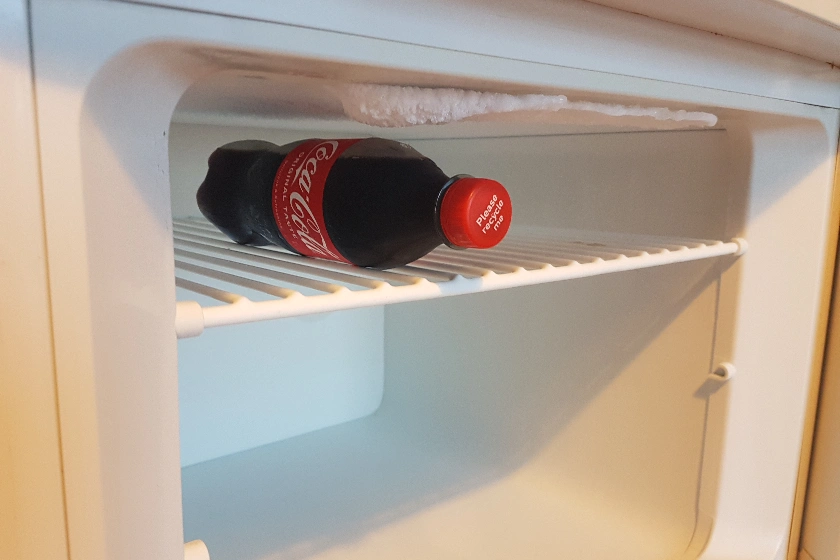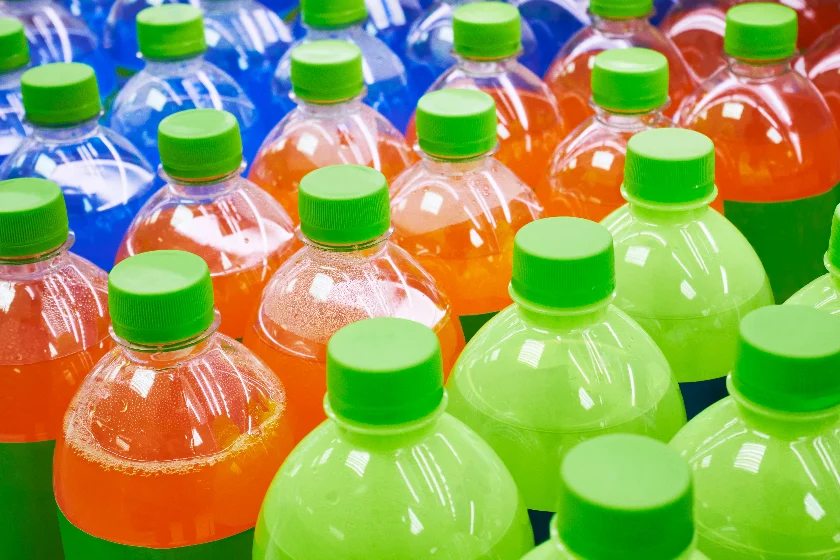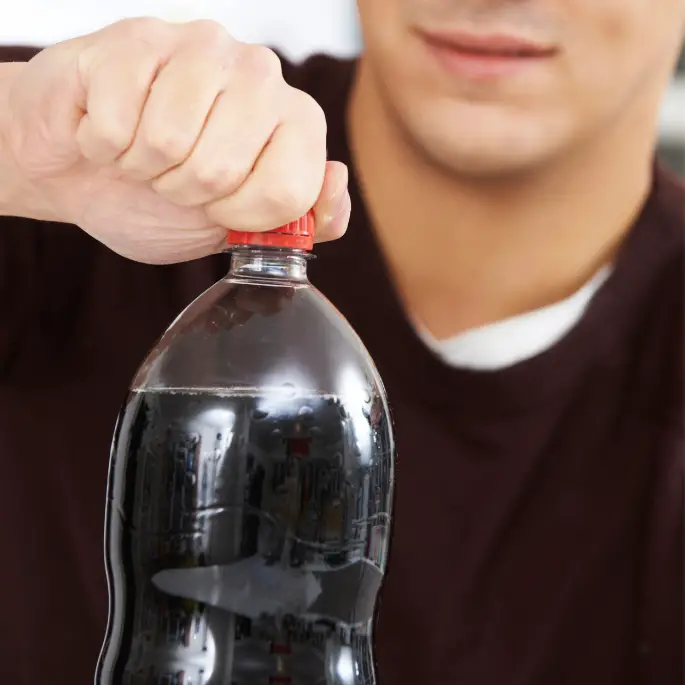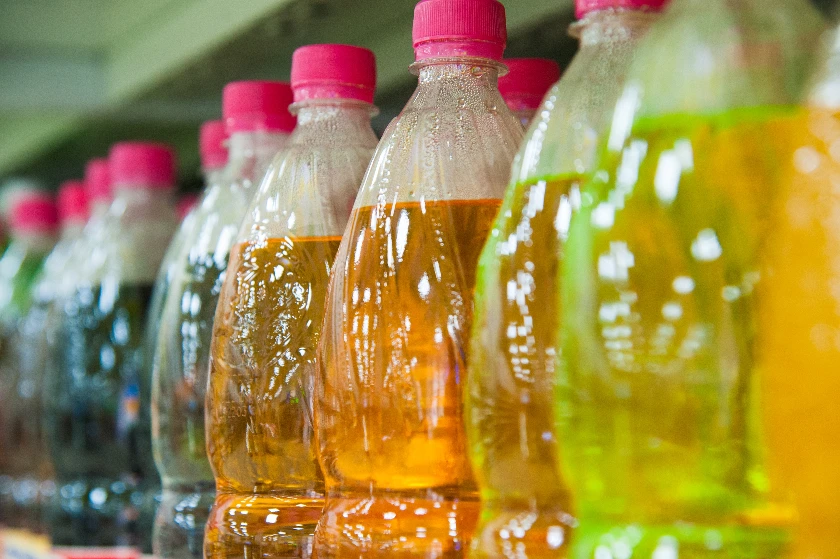
Nothing beats a refreshing, ice-cold soda pop (or a beer for us hop-heads) on a blazing summer afternoon. It’s no secret that cold drinks taste better. But too bad if you forgot to pop the new batch of drinks into the fridge last night! Is it safe to pop a plastic bottle of soda in the freezer for a quick cool down?
A plastic bottle of soda is unlikely to explode in the freezer, but the extra pressure can cause the lid to pop off and the drink to spill. Water expands as it freezes, creating additional stress and forcing the carbon dioxide out, causing it to eventually burst.
It’s worth noting that glass bottles and cans are less forgiving than plastic bottles.
So is chilling your soda in record time or making a soda slushy really worth the risk? While soda cans and glass bottles could explode in the freezer, will the same happen to a plastic bottle of soda? Let’s find out.
Can You Freeze Soda In Plastic Bottles?
It’s not advised to freeze soda in plastic bottles but it is the better option out of cans or glass. Plastic is more flexible and doesn’t become so brittle when cold, making it the safest storage container to use in the freezer.
While they typically won’t explode in the freezer, the excess pressure can cause the plastic bottle’s lid to pop out and spill if you are unlucky. And it can cause a big mess.
Ultimately, what happens when sodas and other carbonated drinks face the freezer’s wrath depends on the vessel’s material and how much spare space is inside.
You might have heard about the Chinese boy who wound up with 38 stitches after an intact can of frozen cola exploded in his face.
Soda cans can cause serious harm if they are stressed to their limit after freezing them. They can explode while in one’s hand from the additional stress of popping the top. In addition, glass bottles are likely to shatter, leaving a destructive mess in your freezer after bursting.
While plastic bottles are deemed the safest vessel for freezing sodas, at a risk, you might get away with using PET (polyethylene terephthalate) plastic bottles to freeze your soda.
Freezing sodas may seem like a foolproof method for slushies and icy beverages, but if it’s carbonated, you should freeze the drinks with caution or avoid it altogether.

How Long Can Soda Be Left In The Freezer?
Avoid putting sodas in the freezer for longer than two to three hours as they will freeze. Around this time, your carbonated drink might explode, leaving a big mess in your freezer especially if stored in a can or glass bottle.
You only need about 10 minutes for a small bottle or 20-30 minutes for a larger bottle to chill it down, so try not to leave it for much longer.
The duration that it takes for soda to freeze depends on your freezer’s temperature and your drink’s sugar content. The more sugar in your soda and the colder the temperature, the faster it will freeze.
Sodas containing the standard sugar content freeze faster than sugar-free drinks with alternative sweeteners. However, these drinks typically chill in twenty to thirty minutes unless you want to make a slushie. If so, allow the soda to chill for an hour in the freezer.
On average, sodas take up to three hours to freeze; however, they only freeze partially.
The flavoring and sugar content lower the soda’s freezing point below plain water. However, soda’s molecules do not bind together and form a solid when the temperature drops below a certain point. Instead, the carbon dioxide and sugar syrup prevent the soda from freezing entirely and cause it to remain in a semi-frozen consistency that crumbles to the touch.
Because of the risk of exploding or breaking the container, consider storing the sodas in the fridge if you aren’t in a rush or if you’re absent-minded and tend to forget about them in the freezer.

Why Do Sodas Explode In The Freezer?
Soda’s content is almost entirely water. Then, sweet syrup and large amounts of carbon dioxide – the chemical compound responsible for the distinctive fizz – are added to the drink.
Sodas explode from the expanding ice and the extra pressure from the carbon dioxide gas in the bottle.
While most substances contract when cooled, water behaves differently and expands as it freezes. The carbon dioxide molecules naturally contract and slow down when they freeze. Still, the water continues to expand rather than shrink in freezing temperatures.
Water molecules’ hydrogen atoms are attracted to oxygen atoms in other nearby water molecules. As a result, they bind to form a rigid structure during ice crystal formation. The rigid structure takes up additional space than the same molecules in liquid form.
Soda containers are designed to contain a specific amount of liquid. So, once your soda hits the freezer, the water gradually expands and creates additional pressure in the vessel, forcing the carbon dioxide out. As a result, the carbon dioxide accumulates in the limited remaining space in the container.
The expanded water volume puts pressure on the increasingly cramped reservoir of carbon dioxide gas, which changes the volume radically and stores far more energy than pressurized ice.
The pressure of the carbon dioxide causes the soda container to eventually burst, leaving you with an ice-cold, slushy mess.
Whether you’re freezing cola for slushies or trying to cool down a six-pack for the boys, you’ll end up with a sticky disaster if you forget to take them out in time.

Will A Frozen Bottle Of Soda Explode When It Thaws?
Thawing soda may see the can or bottle expand or may see it contract but it is unlikely to explode. The ice melts into a liquid which releases pressure but the carbon dioxide can expand and force extra pressure outwards.
Consider yourself lucky if your bottle of soda didn’t pop open in the freezer. It’s best to thaw your bottle slowly at this point to minimize the effects of rapidly changing temperatures.
We already covered that the flavoring and sugar lower the soda’s freezing point to below plain water. In addition, the water causes the soda’s volume to expand when frozen, forcing the carbon dioxide out and placing the can or bottle under significant stress.
So, when you open a bottle of soda, the carbon dioxide gas rapidly escapes, and the can or glass bottle may explode from the stress of popping the top open. However, plastic bottles typically do not explode during thawing, but they might swell.

How To Stop A Frozen Soda From Exploding?
It’s essential to allow the frozen soda to thaw before opening to prevent it from exploding.
Here’s how:
- Let the soda sit at room temperature: After removing the frozen soda from the freezer, leave the soda out at room temperature for several hours until adequately defrosted.
- Try a water bath: Pop the frozen soda into a water bath if you need to speed things up. You can use cool or lukewarm water. Place the soda in a sink filled with water for 15 minutes or until fully defrosted. You can change the water frequently to speed up the process.
- Overnight refrigeration: If you’ve got time to spare, let the soda thaw overnight in the fridge. The soda will take around eight hours to fully thaw.
Check out my post on how to calm a shaken soda for some more tips.
Conclusion
So let’s recap on whether a plastic bottle of soda will explode in the freezer. Despite a plastic bottle being the safest storage container for freezing soda, the extreme temperature, and excess pressure can cause the lid to pop off and the liquid to spill.
Remember to first thaw the soda before opening it up for a swig to ensure it doesn’t explode. Although it is unlikely, it is known to happen.
